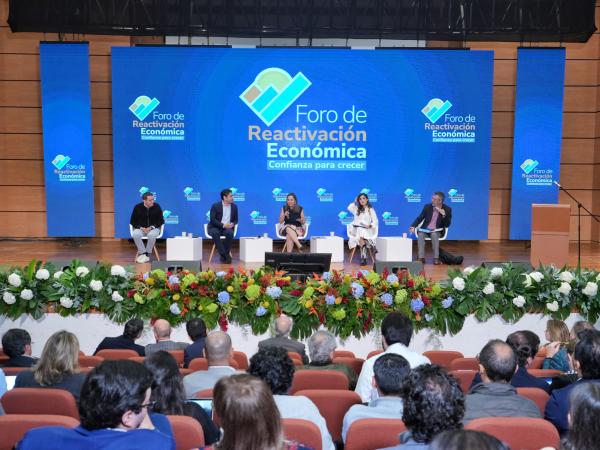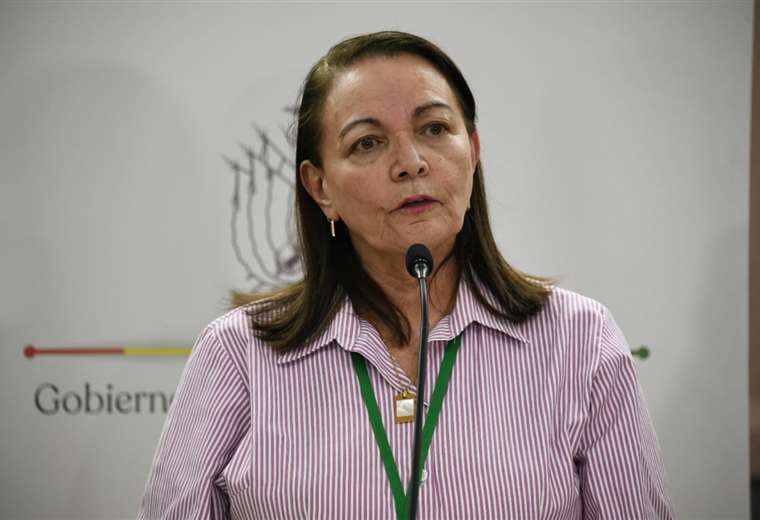Within the framework of the Economic Reactivation Forum, held in Manizales this Friday, the Government, together with the private sector, signed a series of commitments, under seven axes and two objectives, in order to work in a coordinated manner and define clear goals to reactivate the Colombian economy.
Alexander López, director of the National Planning Department (DNP), explained that three of these approaches will be directed towards the housing, infrastructure and tourism, one of the sectors in which the unions have requested special attention in recent years.
You can read: Want to travel with your cat? JetSmart launches $1 promotion
“There will be seven lines for the economic reactivation of the country, and under two approaches: sectors where each peso invested is multiplied into more employment and investment, compared to other sectors of the economy and, in the medium term, sectors that allow a productive transformation,” said Lopez.
With this plan, The Government seeks to distribute state resources between communities and large companies, in order to create conditions to generate wealth, close social and territorial gaps and thus achieve peace.
Habitat, one of the pillars of the plan
The housing and water ‘for life’ approach It will guarantee the rights of Colombians and strengthen the development of the country’s productive fabric.ensuring that 14 million Colombians who do not have access to drinking water can access it, says the DNP.
This goal, thus stated, not only considers large, medium and small cities with housing as the center of the policy, but prioritizes habitat as a whole that allows for the development of the regions.
For Helga María Rivas, Minister of Housing, City and Territory, the axis called ‘habitat’ will not only promote housing, hand in hand with the private sector, but will also focus on working on access to water and housing improvements, she said in the first panel of the meeting.
“It is very important that we invite everyone to work in this process of building habitat, and that we work on it as something between us and that has immense repercussions on the national territory, especially the issue of drinking water and zero waste,” the head of the portfolio said at the meeting.
She was very clear that she does not want the Ministry to be seen only for subsidies, but for how an actor who strengthens the relationship of Colombians with their environment.
“We are regulators, we create policy and we are not just a family housing subsidy. However, this subsidy brings together a great social mobilization about what this is about building habitat: from housing improvements to the acquisition of new housing,” he pointed out.
In this regard, Guillermo Herrera, president of Camacol, pointed out that by having these spaces for dialogue, they will be able to reach better commitments on both sides. He also recalled that before the pandemic, construction represented 4% of the country’s GDP, today it is only 2.2%. Likewise, that 170,000 jobs were lost per month during the pandemicin 2021 200,000 were generated, in 2022 it reached 57,000 and in 2023 it reached 19,000 and This year it dropped by 7,000which is why it is considered essential to think about reactivation strategies.
“We need to find resources and to do this we can work with the regions. In addition to being green, we need to territorialize and seek concurrence in investment sources. When we review some of the development plans of the country’s departments, we find that investments of more than $1.2 billion are being planned over the four years in 85,000 homes. That is why I propose to see, in addition to the six weeks, how we can join forces in subsidies,” mentioned.
You can read: Government advances tender and award of 4 5G projects for this year: what are they?
Economic Recovery Forum: ‘Confidence to grow’, housing panel
Minivivienda
In turn, Carlos Alberto Ruiz, vice president of Asobancaria, recalled that this type of initiative will allow the country’s economic development. He highlighted the importance of the housing sector and the signing of this document, understanding that One in five jobs in the country is linked to the industry and three out of four inputs are of national production.
“Boosting construction means boosting the entire productive apparatus, it means protecting families, there are more than 4 million of them who earn their living through the construction sector. To give it that boost we need six elements, one of the most important being trust for all the actors in the chain,” mentioned.
Infrastructure, balance between public and private
In the second panel of the meeting, the Minister of Transport, María Constanza García, spoke about the need to work together and maintain a balance between large-scale projects and small works in the regions, however, prioritizing and taking into account historically forgotten territories.
“Today, reality forces us to coordinate, prioritize, concur and help each other to be able to bring investment to these (rural) territories to connect them by road, air and river. Infrastructure must be thought of in terms of how we read the needs without leaving aside strategic projects,” points out.
In line with this, Juan Martín Caicedo stressed the need to focus the efforts that can be made by the Government to maintain the business fabric of small and medium-sized enterprises, which number more than 65,000 in the country, in these and other projects.
Meanwhile, the Minister stated that it is It is important to identify those projects that achieve progress in the territories, so that all actors can prioritize and allocate the necessary resources for its execution.
“We have to add, because there are funding challenges. We have to base the relationship on trust with other entities, in order to meet the schedules, especially with the promise we make to Colombians who hope to improve their quality of life thanks to infrastructure and transportation works,” the Minister stressed.
To this end, the executive president of the CCI, Juan Martín Caicedo Ferrer, said that it is necessary to be creative in the search for new sources of financing. “We welcome the appreciation, we are willing to look at pilot projects in other regions of the country. We have reached an agreement with the national government to create a scenario of legal security to reactivate the economy, release future terms and liquidate contracts. A series of private initiatives are on the table, which without requiring public resources can start moving forward,” were some of the words of the manager.
Also read: Residents of strata 3,4,5 and 6 would have a new charge with this reform

Economic Recovery Forum: ‘Confidence to grow’, infrastructure panel
Ministry of Transport
For her part, the executive president of Corficolombiana, Milena López Rocha, said that there is a shared purpose which is the development of Colombia, which is why “In order to reactivate the private sector, it needs help to navigate the complexity of the procedures that need to be done, with a single table where we can jointly solve the problems to unblock many of the projects, which means the execution of works,” he explained.
Finally, Garcia pointed out: “We have a responsibility to development, to how our sector contributes to the reactivation. Infrastructure is not an end, it is not built to count kilometres, airports, docks, it is built to serve a purpose, to achieve regional convergence, to improve connectivity, to achieve equity.”
Tourism, in harmony with life
In the fourth panel, ‘Industrialization and tourism: a key route to reactivation’, the leader of the travel agency sector, Paula Cortés, president of Anato, stressed the vital importance of the recovery of domestic tourismwhich month after month shows lower figures, only offset by the growth of foreign tourists arriving in the country.
“One of the barriers to reactivation is focused on security and the other is informality in the tourism sector that has to be regulated,” mentioned at the meeting.
Regarding this, the Minister of Commerce, Industry and Tourism, Luis Carlos Reyes, pointed out that it is due to the economic slowdown that the country is going through, however, there is nothing abnormal regarding the flows of the economy.
“Sometimes we try to go back to what we had and that sometimes worked, or we get desperate and want to distance ourselves from everything and in reality the challenge is cultural, to build trust and move towards something new in economic and social matters,” mentioned.
Therefore, she asks the different sectors to think about a change with the popular economy, without replacing the thinking about the macroeconomic economy. On this, Anato asks to work with PDET municipalities, they would generate employment and the Government, a reduction in its taxes, which she considers a ‘win-win’. In addition, Cortés reiterated the need to lower VAT on tourist products again to stimulate demand.
Read: After two years of government, the commitment to tourism is bearing fruit

Economic Recovery Forum: ‘Confidence to grow’, tourism panel.
Ministry of Commerce
However, the president of Anato pointed out that they are already working with the Government in line with the popular economy. This project, which will cover several areas of the country, will consist of transmitting the knowledge of the large travel agencies to the smaller ones and thus ‘build the country’ and sell these territories at major international fairs.
In addition to the popular economy, Reyes assures that the Government will continue to promote the country internationally and improve the adequacy of the infrastructure.
Paula Galeano Balaguera
Portfolio Journalist
















